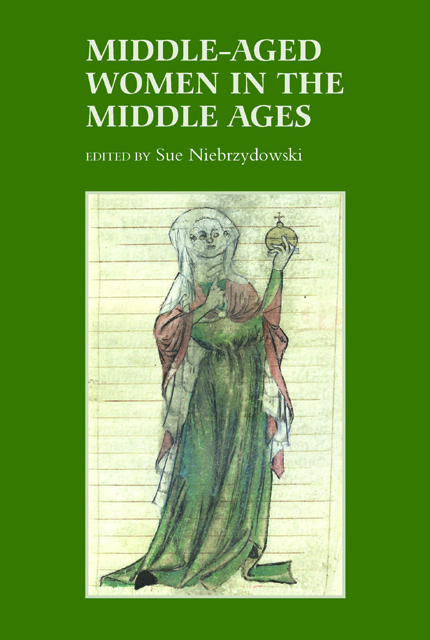Book contents
- Frontmatter
- Contents
- List of Plates
- Abbreviations
- Contributors
- Introduction: ‘Becoming bene-straw’: The Middle-Aged Woman in the Middle Ages
- 1 The Age of Discretion: Women at Forty and Beyond
- 2 Seeking the Middle-Aged Woman in Medieval Wales
- 3 Middle Age in Romance? Magic, Enchantment and Female Power
- 4 Age and Desire in the Old English Life of St Mary of Egypt: A Queerer Time and Place?
- 5 The St Albans Psalter: Sex, Desire and the Middle-Aged Woman
- 6 Speaking Volumes: the Middle-Aged Woman and the Book in Medieval England
- 7 ‘Late hir seye what sche wyl’: Older Women’s Speech and the Book of Margery Kempe
- 8 Preparing for Mature Years: the Case of Margaret of Anjou and her Books
- Select Bibliography
- Index
5 - The St Albans Psalter: Sex, Desire and the Middle-Aged Woman
Published online by Cambridge University Press: 14 February 2023
- Frontmatter
- Contents
- List of Plates
- Abbreviations
- Contributors
- Introduction: ‘Becoming bene-straw’: The Middle-Aged Woman in the Middle Ages
- 1 The Age of Discretion: Women at Forty and Beyond
- 2 Seeking the Middle-Aged Woman in Medieval Wales
- 3 Middle Age in Romance? Magic, Enchantment and Female Power
- 4 Age and Desire in the Old English Life of St Mary of Egypt: A Queerer Time and Place?
- 5 The St Albans Psalter: Sex, Desire and the Middle-Aged Woman
- 6 Speaking Volumes: the Middle-Aged Woman and the Book in Medieval England
- 7 ‘Late hir seye what sche wyl’: Older Women’s Speech and the Book of Margery Kempe
- 8 Preparing for Mature Years: the Case of Margaret of Anjou and her Books
- Select Bibliography
- Index
Summary
The St Albans Psalter is not an obvious choice for investigating issues about the sex interests of medieval women in their middle age. Rather, it is a radiantly spiritual book, lavishly illuminated to enhance the meaning of its texts. However, a close interrogation of the illuminations shows that at least some of them are slanted in response to its primary reader and patron: the anchoress Christina of Markyate and her mentor Abbot Geoffrey of St Albans. The love letters of their contemporaries in Paris, Peter Abelard and Heloise, express in agonising detail the emotional, spiritual and physical conflicts suffered in the twelfth century by those aspiring to a religious life but also caught in the toils of a love affair. By contrast, the documentary evidence for Christina and Geoffrey is more circumspect and chaste, but texts and these illustrations provide a window on their thoughts, conversations and hopes. I shall argue that not only do many of the historiated initials deal with the subject of sex and chastity but also that this subject matter must have provided stimulation for discussion between Christina and Abbot Geoffrey.
Christina of Markyate died after 1155; events early in her life suggest a birth date around 1096–8. A combination of stylistic, palaeographic and historical factors suggest the psalter was made possibly around 1130 or a little later, placing her in her mid-thirties. At around that time she became a nun, and one could say passed beyond the potential travails of child-bearing, and thereby entered her middle age.
Christina was a high-spirited Anglo-Saxon girl from Huntingdon, who, at an early age, vowed to dedicate her life to Christ. As a young woman she escaped the attempt of Bishop Ranulf Flambard to rape her. She received spiritual guidance from Sueno, the family priest, who was ‘still so stimulated with lust that unless he were prevented by God, he would without shame lie with an ugly leper’. On the eve of her forced wedding, she sat her husband down on the bed and lectured him about the advantages of a chaste marriage. Shortly afterwards she made a dramatic escape from home and ran away to the woods, to live in hiding as an anchoress at Markyate, outside St Albans.
- Type
- Chapter
- Information
- Middle-Aged Women in the Middle Ages , pp. 69 - 82Publisher: Boydell & BrewerPrint publication year: 2011
- 1
- Cited by



